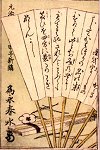
|
|
|
|
|
 |
 |
 |
 |
 |
 |
|
|
|
The First Constitution Japan's first constitution was not an imitation of any foreign charter. Unlike western constitutions, its base rested on the principle of a divine emperor, an absolute ruler and deity whose sovereignty was unquestioned. But it did provide for a parliament, the Diet, consisting of two houses, the nobles and, in theory, the commoners. The father of the Japanese constitution was Ito Hirobumi, who had been appointed by the Emperor in 1881 to draft it. His knowledge of western government began when he defied the edict of the Tokugawa government and sailed to Europe while the country was technically closed. Later trips were made as a government envoy. Ito worked on his draft of the constitution for a total of eight years. Feeling that it should be shaped to the traditions of the country, he was in no hurry to adopt an unworkable system. When finally presented in 1889, it represented an unlimited monarchy, for all ministers of state as well as heads of the army and navy reported directly to the Emperor rather than to the Diet representatives. Yet, limited thought it was, Ito's constitution was the beginning of representative government in Japan based upon law, and it added measurably to Japan's growing prestige in the world.
|
